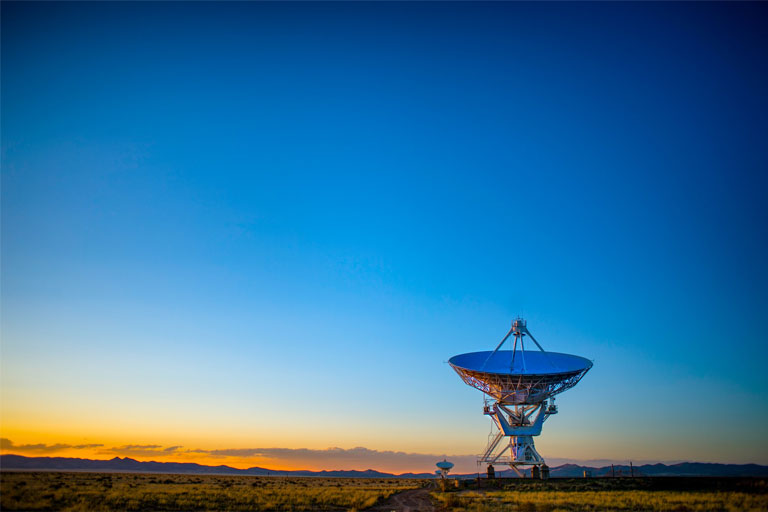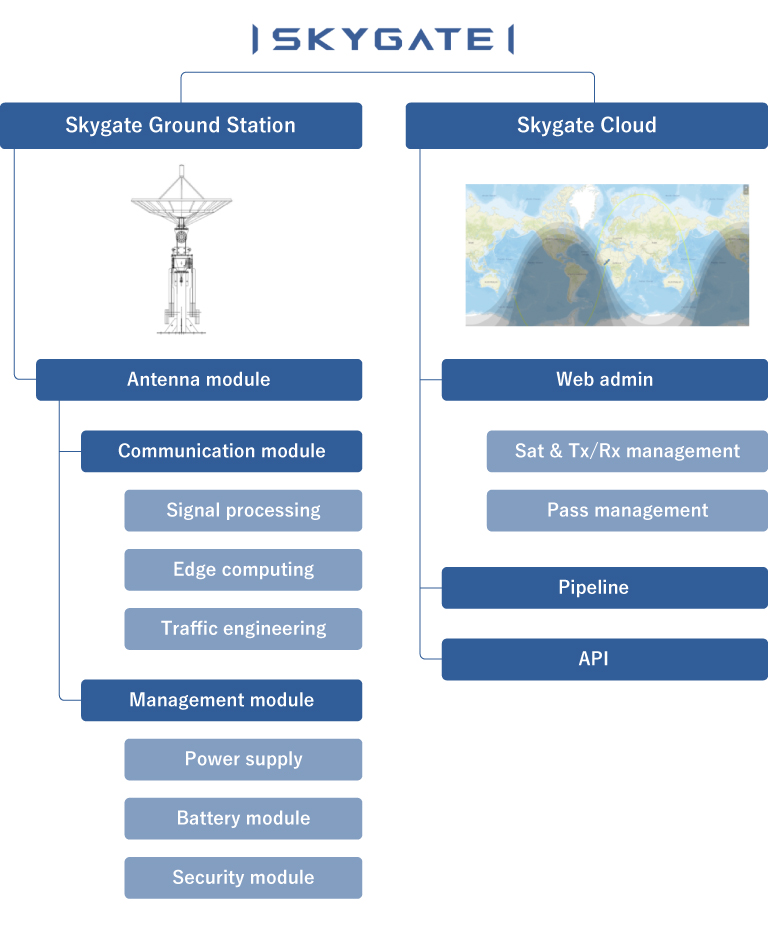
“宇宙×通信”で臨むデータビジネスの新市場
今後の社会の鍵を握るといわれるデータビジネス。
しかし、人工衛星による地球観測データの利活用には処理システムや法律などの高いハードルが存在する。
この状況を独自のインフラサービスで打破するべく設立されたのが、スカイゲートテクノロジズ。
地球のデータを全人類へ解放する、その展望やいかに。
人工衛星のデータとつながる、画期的なクラウドサービス
私たちは、人工衛星のデータを地球上で高速受信し、さらなる活用につなげるクラウド地上局プラットフォーム「Skygate」の開発と展開に取り組んでいます。宇宙ビジネスと呼ばれる領域の中でも、弊社の目的はアンテナなど地上設備のハードウェアと、そのデータ処理などソフトウェアの両面から、衛星データの利活用を促進することにあります。
背景にあるのは、人工衛星の観測データを金融・保険、土木・建築・都市開発、農林水産業などのビジネス領域で活用する動きが高まっていること。例えばアメリカでは、スーパーマーケットの駐車場に停まった車の台数を元に売上を決算発表よりも早く予測したり、港に並ぶコンテナの数から輸出入量を調べたりするなど、データをいち早く提供するサービスが誕生。保険業界では自然災害の影響の見積もりや、農林水産業では作物の発育状況から価格を分析したり、海水温データから漁場を割り出したりするなどの取り組みが進められています。

しかし現状では、この領域への参入には高いハードルが数多く存在します。例えばハード面では、人工衛星の軌道を正確に追尾し続けることのできるアンテナを用意し、地上局を設置しなければならない。ソフト面でも、受信したデータを活用できる形にする際に様々な処理が必要になる。地上局で受信したデータを依頼先へ届けるまで、インターネット回線の速度や物理的な距離がネックとなり、最短でも数日を要する状態です。
そこで弊社が開発したのが、人工衛星の追尾性能が高い小型アンテナユニットと、従来の10倍以上の高速通信が可能で様々な通信方式に対応できるソフトウェア。「Skygate」はこのハードとソフトの両面から、衛星電波を受信し、様々な処理を経てデータをクラウドへ転送するまでのインフラを一気通貫で提供するサービスです。いわば、衛星のデータが直接クラウドにつながっているような感覚で、より簡単に衛星データを活用できるようになる。クラウド上から人工衛星に対し、「このスケジュールでこういう通信データを取得したい」という制御を行うことも可能になります。
自衛隊・防衛省での経験が拓いた、データインフラの新領域
この新たなインフラを私たちは、クラウドサービスにまつわる「IaaS(アイアース/Infrastructure as a Service)」や「PaaS(パース/Platform as a Service)」になぞらえ、「GSaaS(ジーサーズ/Ground Station as a Service)」という呼び名で確立したいと考えています。目標は、今後のビッグデータビジネスにおいて大きな可能性を秘めた衛星データを、WebやIoTなど他のデータソースと同様に使いやすくすること。それが実現すれば、アンテナ設備などを持たない事業者がより自由に衛星データのビジネスに参入できるようになり、新たなアイデアや付加価値に基づくアプリケーションやサービスの新市場が切り拓かれていくはずです。

ただ、そのためには先ほどお話ししたハード面、ソフト面に加えてもう一つ、大きなハードルがあります。それは、衛星データの活用には国ごとの法律をクリアする必要があること。日本の場合、「衛星リモートセンシング記録の適正な取扱いの確保に関する法律(通称:衛星リモセン法)」が制定されており、この法律への対応と、データ保護やライセンス取得などに大きなコストがかかります。弊社はこのライセンスを取得することで、技術的な側面に加えて事業者の参入ハードルを大きく引き下げたいと考えています。
そもそも何故、衛星データの活用インフラに着目したのか。その理由は、私自身が通信や宇宙分野につながる経験を重ねてきたことにあります。
まず“宇宙”については、幼少時より憧れを抱いてきたものの「宇宙には突出して頭の良い人しか関わることができない」と思い込み、ものづくりの道へ進もうと決意。慶應義塾大学の理工学部へ進学しました。その在学中に、動画のストリーミング中継を手がける会社を友人たちと立ち上げたことが、通信分野との最初の接点です。卒業後も就職せず、事業に力を注ごうと考えたのですが、ここで次の転機が訪れました。
それは、2011年の東日本大震災。被災地でボランティアや臨時災害放送局の立ち上げに取り組むなか、強力な通信網を一から展開する自衛隊の組織力を目の当たりにして、心を掴まれたのです。興味本位から入隊する流れになり、運良く通信部隊に配属され、14年の御嶽山噴火に伴う災害派遣では衛星アンテナや無線通信施設の設置、サーバーや各種通信端末の管理まで、一から通信インフラの構築に携わりました。続いて防衛省ではサイバーセキュリティやシステム監査の任務に就き、情報の組織的な運用について理解を深めることもできました。
“宇宙からの視点”がもたらす、地球と人類のよりよい未来
その経験に続いて訪れたのが、宇宙分野とのより密接な関わりでした。きっかけは、クラウド会計ソフトなどを展開するfreee株式会社に、法規制とセキュリティ分野の人材としてスカウトされたこと。煩雑なバックオフィス業務を合理化し、あらゆる人が本質的な価値を発揮できるようにするという同社のビジョンに共感し、転職を決意しました。入社1年後からは副業として、小型衛星の開発企業にセキュリティエンジニアとして参画。データドリブンな意思決定でビジネスを行っている様子に触れる中で、より多彩かつ詳細なデータが欲しいと考えるようになったのです。その時に思い浮かんだのが人工衛星。というのも、人工衛星は宇宙から地球を1日に何度も観測しており、膨大なデータを蓄えているはず。そこで人工衛星の観測データを入手しようとしましたが、実際にビジネスで使える形のデータは存在しなかった。その理由を調べていくと、衛星地上局の開設をはじめ、数多くの制約があることがわかったのです。人工衛星も地上局も誕生から半世紀を経た“枯れた技術”のはずなのに、その活用につながる仕組みが整っていないのは何故だろうか。これまで自分が培ってきたスキルを総動員すれば、この問題を解決できるのではないか。その想いから事業化への決意を固め、20年2月にスカイゲートテクノロジズを設立しました。
KIIとの出会いは、設立直後のことでした。私が慶應義塾大学出身だったことに加えて、KIIは小型衛星の開発などを手がける株式会社シンスペクティブに出資しており、その視点から衛星事業とのシナジー効果などを評価していただきました。深い理解に基づくアドバイスはもちろんのこと、「慶應義塾大学のベンチャーキャピタルから支援を得ている」という社会的な信頼も相まって、非常に心強く感じています。

現在は、21年中のサービス開始に向けて準備を進めているところです。日本は高い技術力を誇る製造業を有するなど、世界の宇宙産業において高い信頼を築いてきました。国際的に安定した国であることも衛星データのダウンリンク先として大きな意味を持っており、今後のグローバル展開にとって追い風になるでしょう。例えば、私たちが開発したアンテナは従来の大型のものとは異なり、輸送性に優れ、設置後も無人で運用できます。これは自衛隊での経験を反映したもので、世界展開を視野に入れた自信作です。
そして将来的には、“衛星データの受信から活用まで10分以内”という境地を達成したい。地球上のどんな場所でも10分前の状況がわかる世界になれば、様々なサービスが飛躍的な発展を遂げるはず。利便性はもちろん、自然環境への負荷を減らし、災害から人々の命を守るなど、予想を超えた新たな価値がもたらされることでしょう。衛星データは、人々の生活に必要不可欠なインフラになる。その新たな時代を、「Skygate」で切り拓いていきたいと思います。
【公式サイトへのリンク】
https://www.skygate-tech.com/